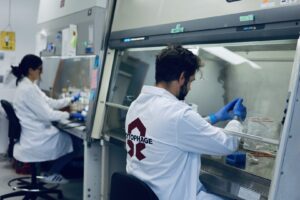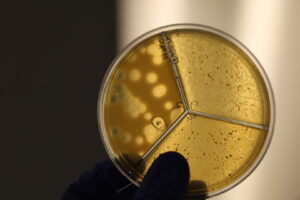Agriculture
October 16, 2023—A scientist co-discovered phages, viruses that only target bacteria, in 1915 and used them to treat cholera during a 1927 epidemic. The emergence of broad-spectrum antibiotics in the 1940s put the research and use of phages on the backburner. However, the rise of antibiotic-resistant bacteria is changing that and Cytophage Technologies Inc. aims to help put phages front and center.
“We love a magic bullet, but when they were first discovered, phages were not a magic bullet,” Dr. Tasia Lightly, a staff scientist at Cytophage, said. “Antibiotics come in and remove everything, killing all the bacteria, while phages work in what used to be a less exciting way.” Individual phages are very specific for their hosts, so they don’t kill everything. However, the positive aspect of this is that they don’t interfere with the microbiome the way antibiotics do.”

Cytophage began working on solutions for the rise of antibiotic-resistant bacteria by focusing on human health, but the Canadian startup recently expanded into agriculture and livestock. Photo courtesy of Cytophage
Cytophage began working on solutions for the increasing resistance problem by focusing on human health but expanded into agriculture and livestock. Up until recent regulatory changes, ranchers often gave livestock antibiotics, even if they were not sick. This preventative measure also had the side effect of helping the animals gain weight. Those antibiotics get into the groundwater and stay in the meat itself, leading to human consumption. That means not only do the animals start to harbor antibiotic-resistant bacteria, but so do the people who consume the meat.
“Approximately 65% of antibiotics worldwide are used in agriculture,” Lightly said. “Antibiotics as growth promoters is a misuse. We’ve seen the exact same applications in plants and livestock that is causing problems in human health in the hospital.”
This misuse extends to other areas as well, such as the over prescription and improper utilization of antibiotics in healthcare, resulting in fewer and fewer effective antibiotics.
Even though phages are viruses, there is no concern with them mutating—in fact, a mutation might actually be helpful.
“Here’s the beauty: If our phages mutate, it’s usually to attack the bacteria better, and that’s good for us,” Lightly said. “If the bacteria evolve to resist the phage, then the phages evolve to overcome that resistance. We also have a few techniques in our arsenal. We can design our phages to have already accounted for some resistance in the bacteria. No matter what happens, the phages do not target human cells at all, only bacteria, so they are a safe option.”
The goal now is to convince the agricultural community to start using phages instead of antibiotics, especially since many areas no longer allow the use of antibiotics due to new government regulations. While Cytophage cannot guarantee the same weight gain at this point, the company is seeing positive outcomes.
Lightly credits the Wells Fargo Innovation Incubator (IN2) and the Donald Danforth Plant Science Center in St. Louis, Missouri, with putting the company on this more agricultural-focused path.

“If phages mutate, it’s usually to attack the bacteria better,” Staff Scientist Tasia Lightly said. Photo courtesy of Cytophage
“We had not been exploring plant diseases and products, so it opened up a new avenue of research,” she said. “Because of our connection with the National Renewable Energy Laboratory (NREL) and the Donald Danforth Plant Science Center, we got access to strains that were causing problems with the cassava plant, a primary food staple around the world. After we received the disease-causing strain, we were able to find phages to fight against it. These are strains from around the world that we didn’t have to travel for, which gives us the opportunity to help people in places we’ve never even visited.”
Phages are also cost-effective because Cytophage can produce a high amount at once and make them more affordable. The company plans to launch its first product that will be sold by a distributor in 2024.
“We’d really like to see phages become more popular in the next 5 to 10 years, especially in Canada and North America,” Lightly said. “We’re working hard with regulators to understand the differences between phages and traditional drugs (antibiotics) create a pathway to make phages accessible as quickly as possible.”
Learn more about members of the IN2 portfolio in the agriculture space.
